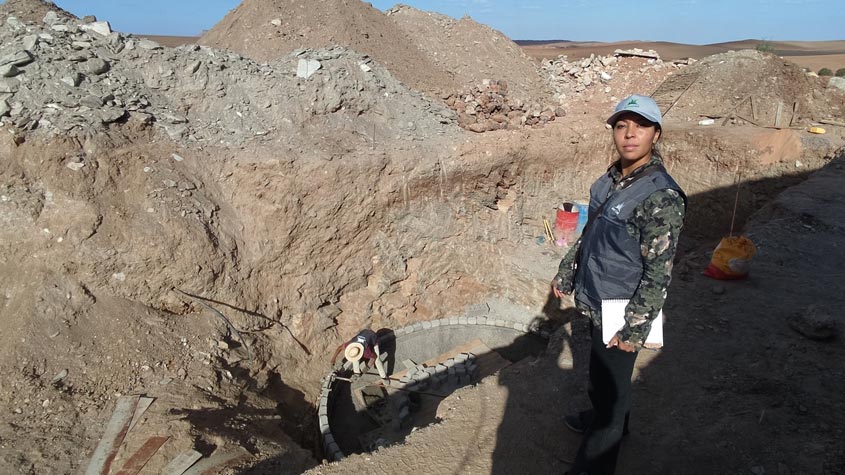Biodôme du Maroc brings renewable energy to local farmers
Eco-innovative farming solutions are vital to ensuring the global reduction of greenhouse gas (GHG) emissions related to agriculture and to providing farmers with sustainable and cost-effective production methods. This understanding is central to the mission of Biodôme du Maroc, a small, fast-growing Moroccan company that provides local farmers with a technology that gives them access to renewable energy for on-farm use.

Founded in 2013 by Dr. Fatima Zahra Beraich, Biodôme du Maroc is the first Moroccan company to specialize in the recovery of organic waste through natural treatment and environmentally friendly processes.
After completing her doctoral thesis on anaerobic digestion at the Hassan 1er University of Settat, Dr. Fatima Zahra Beraich, enrolled in a business development program offered by university, which led to the establishment of Biodôme du Maroc.
Dr. Beraich is an inspiring example of innovation, entrepreneurship and persistence in an area historically dominated by men. She has received many prizes, including the Best Woman Entrepreneur Prize at the Global Clean Technology Innovation Program (GCIP) Maroc 2016 and the Tamayuz Prize for Moroccan Women in 2017, which recognizes the achievements of female entrepreneurs in Morocco.
Dr. Beraich established Biodôme du Maroc because she wanted to develop a way to recover and treat agricultural waste in an environmentally friendly way to enable farmers in rural areas to produce biogas and fertilizer.
Delivering a sustainable alternative to propane gas

organic waste, Biodôme du Maroc gives local farmers
access to renewable energy for agricultural production.
(Photo: Courtesy of Biodôme du Maroc)
In rural areas of Morocco, bottled propane gas – by far, not the most sustainable option – is the main source of energy for cooking, cleaning and pumping water. With her invention, Dr. Beraich is enabling farmers to access a more sustainable source of energy from their agricultural waste; one that can be used to produce biogas and high-quality fertilizer.
I thought to myself, why not replace the propane gas cylinders with a system that basically exists already, but just needs modernizing to make it viable and sustainable in the long term, says Dr. Beraich.
The biogas and the high-grade compost produced when organic matter breaks down have numerous benefits for farmers and the environment.
For farmers, the ability to produce gas from organic waste makes it an attractive, low-cost source of renewable energy. Bio-digestion also produces high-quality organic fertilizer that farmers can use to improve crop yields, reduce costs and improve profit margins.
For the environment, biogas helps to reduce greenhouse gas emissions from abandoned organic waste and minimizes the risk of polluting water ways. This “clean” method of energy production also reduces reliance on wood as a fuel source.
Biodôme du Maroc offers a range of small-scale agricultural anaerobic digesters, including:
- The BIODOME: An anaerobic digester built in concrete and buried in the ground that produces biogas and compost on a daily basis.
- The BIODOME composter: An electromechanical composter that rapidly composts food waste on site, without noise or smell.
- The Domestic Composter: A small composter designed for home use.
Biodôme’s digesters use a simple and innovative system to produce biogas and recover organic matter. Inside underground concrete enclosures, farmers can deposit different kinds of organic waste, such as household, plant and animal waste, which is fermented in a biological accelerator. In this process, gas is produced through methanization or anaerobic bio-digestion where bacteria naturally break down organic matter within weeks. The technology is easy to use and inexpensive and offers farmers an independent and sustainable power supply in the form of biogas and a low-cost stream of organic fertilizers.

Biodôme du Maroc and patents
Dr. Beraich currently holds six patents covering innovations that improve the efficiency and performance of Biodôme’s bio-digesters.
Biodôme’s patents are indispensable assets. They reflect our commitment to research and development and strengthen our reputation as a provider of innovative solutions that meet the needs of our clients,
says Dr. Beraich.
“The process of securing a patent means that our technology is evaluated by experts and allows us to understand just how different our inventions are from other competing technologies. This allows us to protect the inventive characteristics of our outputs,” explains Dr. Beraich. “With these patents in hand, we hope to be able to license our more recent patented innovations.”
The support of the Moroccan Association for Research and Development (R&D Maroc) − part of the network of Technology and Innovation Support Centers (TISCs) in Morocco − has played a critical role in the success of Biodôme du Maroc. “I learned about the TISC network at an outreach event at the University organized by the Moroccan Industrial and Commercial Property Office,” Dr. Beraich explains. “Through such initiatives, many researchers and young inventors have gained a better understanding of what the process of filing for patent protection involves and have benefitted from expert advice throughout that process.”
R&D Maroc helped Dr. Beraich secure seed funding and also ensured she had the help she needed to draft her patent applications, license and access the technology she needed to create and commercialize her bio-digesters.
Biodôme is marketing its patent-protected bio-digesters in Morocco and across Africa. “Our research team is continually looking for ways to develop new technological solutions for future commercialization,” Dr. Beraich explains.